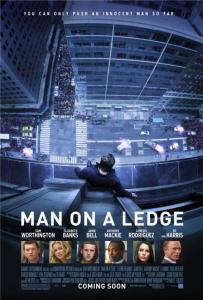 A good heist movie is like a magic trick that lets you in on its secret, pairing a flair for eye-catching drama with a complicated plan that relies on various elements operating in complete sync with one another. When one of those elements feels out of sync or ill-suited for the role it plays in the grand scheme, the heist loses credibility – because in the end, a good heist is about doing the impossible and proving that the odds can be beat with the perfect application of skills, showmanship, and planning.
A good heist movie is like a magic trick that lets you in on its secret, pairing a flair for eye-catching drama with a complicated plan that relies on various elements operating in complete sync with one another. When one of those elements feels out of sync or ill-suited for the role it plays in the grand scheme, the heist loses credibility – because in the end, a good heist is about doing the impossible and proving that the odds can be beat with the perfect application of skills, showmanship, and planning.
And therein lies the greatest flaw of Man On A Ledge, a heist film that never quite lives up to its compelling premise.
In Man On A Ledge, Sam Worthington plays Nick Cassidy, a former cop convicted of stealing a valuable diamond from sleazy real estate tycoon David Englander (Ed Harris). After Cassidy escapes from prison, he makes his way to the Roosevelt Hotel, and decides to take up residence on a ledge 29 floors above a Manhattan street. As burned-out police negotiator Lydia Mercer (Elizabeth Banks) tries to talk him down, she begins to suspect that there’s more at play here than just a suicidal bid for attention,and Nick’s bid to clear his name begins to take form as both complicated heist and evidence of a dangerous conspiracy.
In premise alone, Man On A Ledge makes for a great, Hitchcock-style concept. The characters played by Worthington and Banks are caught up in a mental chess match made even more tense by its setting – a small ledge high in the air over a busy street. Meanwhile, a complicated vault heist unfolds just a few buildings away, and Worthington’s character is tasked with simultaneously managing both the two-person caper team and the efforts of the New York Police Department to find out who he is, why he’s on the ledge, and how to get him down.

Actor Jamie Bell (The Adventures of Tintin, Defiance) plays Joey Cassidy, Nick’s brother and co-conspirator in a heist aimed at proving his brother didn’t steal the diamond by, well… stealing it. Joey and his girlfriend Angie (Entourage‘s Genesis Rodriguez) plan to break into Englander’s vault and prove that he’s had the diamond all along, while Nick occupies the local police force from a ledge a few blocks away.
In theory, it’s a great idea – but in practice, Joey and Angie come off as the sort of people you wouldn’t want to help you move into a new apartment, let alone rob a high-security vault. Most of their on-screen time is spent bickering about their relationship or stumbling through the heist, continually making missteps and then miraculously recovering in the nick of time. Given his brother’s precarious position – both literally and figuratively – Joey rarely shows any concern for the task at hand, instead wasting valuable time fretting over Angie’s past boyfriends or other matters that have nothing to do with the fact that my brother is an escaped convict on a ledge 29 floors above the street and surrounded by police and I need to pull off this complicated plan perfectly in order to save his life and avoid going to jail for the rest of my life, too.

Meanwhile, Rodriguez’ role in the film amounts to little more than eye candy, as Nick’s plan strangely involves multiple costume changes that require Angie to suit up in one sexy outfit after another. To say her heist outfits are impractical is to say Michael Bay films can be a little noisy.
The interaction between Worthington and Banks does provide some of the film’s few bright spots, however, as the two actors play off each other well and make good use of the unique setting for their part of the drama. Sadly, the pair makes the inevitable transition from enemies to allies a little too quickly, leaving you wanting more of the mental chess match they’d been playing, and less of the running, jumping, and shooting that follows it.
And it’s in that last portion of the film where Man On A Ledge really loses itself and compromises its premise.
Worthington spends much of the film’s third act leaping from ledge to ledge and sprinting around the hotel – both inside and outside. It’s a jarring shift in environment and the characters’ perception of it, as the audience is expected to believe the ledge was a terrifying place to even set foot on a short time ago, only to have Nick and an entire squad of police officers begin brawling on it like it’s your typical sidewalk.

It’s unfortunate, really, because Man On A Ledge does have a lot of promise – and there are flashes of that potential in early points of the film, when the audience is still uncertain where things are headed, why Nick is on the ledge, and what he’s got planned. A good heist film makes the enacted plan as interesting as the premise, though, and shows its audience why the end goal could only be achieved under the absolutely ideal circumstances, and with the perfect combination of characters and forethought. For much of Man On A Ledge, it feels like Nick and his team are basically winging it, and the only person who seems to have any grasp of what’s at stake is Nick himself.
When things do reach their conclusion in Man On A Ledge, you don’t feel the sense of accomplishment that good heist films provide. Rather than owing their success to skill or planning, the team seems more in debt to the ridiculously good luck that saved them from their own mistakes time and time again throughout the heist. Heck, with the tidy way everything is wrapped up at the end of the film, you half-expect them to win the lottery in the closing scene, too.
Still, the fact remains that there’s the seed of a great heist film in Man on a Ledge–which makes it all the more frustrating when the movie fails to let it grow.


